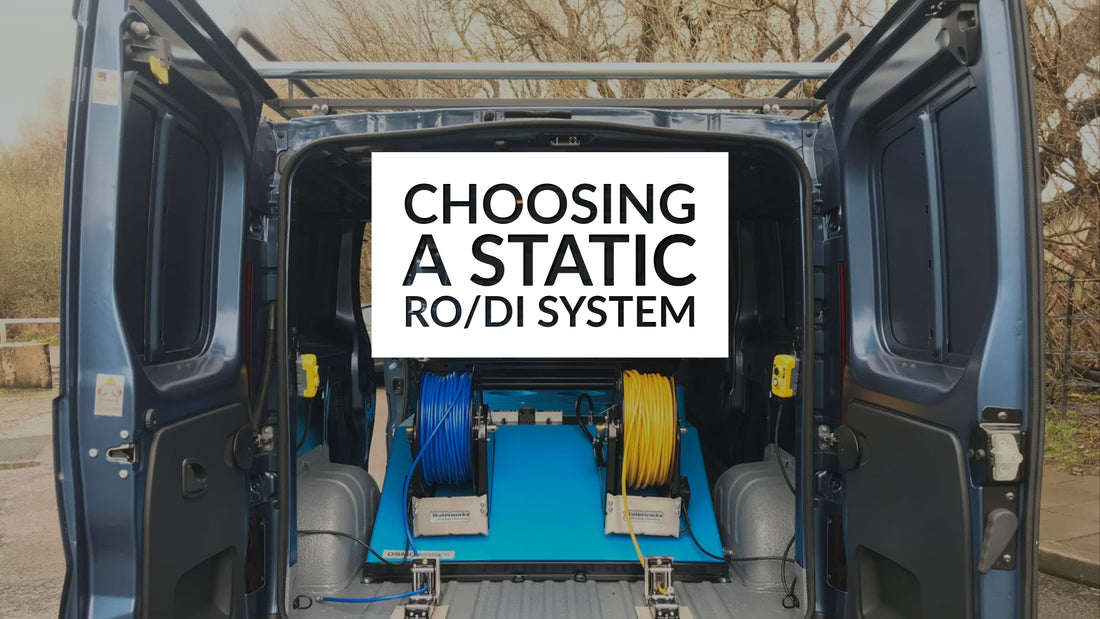(Read Time: 8 Mins)
Here by mistake? click here to go back to the complete guide to pure water cleaning
Not Sure if a static purification system is the right option for you? Take a look at our guide to choosing a Pure Water System HERE.
Are you needing a hand choosing an RO system? We get it, there are a few options with very different capacities (and very different prices). But which one is suited to your business? Do you need a domestic RO/DI System or a top of the range, high capacity system?
Pure water Window Cleaning can be a minefield. Let us give you the low down, so that when you’re looking to pull the trigger, you can make an informed decision!
In the interest of simplicity, the products covered here are separated into a few categories:
- Domestic RO/DI Systems – Filterplus or Merlin RO
- Static Industrial Systems – FaceLift Zero
- On-Demand production – HydroPower RO
The systems range from low to high volume output and price respectively. Okay Lets get started!
1. Domestic RO/DI Systems – FilterPlus or Merlin RO
Domestic systems are usually designed to filter drinking water but also have applications in the cleaning industry as low volume water purification units. The Streamline FilterPlus and Merlin RO are the two front runners in this category.
As a first step into water purification these systems can be brilliant, especially as they are fairly low cost and require very little space. There are a few drawbacks, as you might expect of an entry level system. Take a look at the two front runners in domestic systems:
Streamline FilterPlus
The Streamline FilterPlus is a favourite system for one-man-band Window Cleaners. They start at £249.00+VAT and increase in price as the potential pure water output increases.
The 300 & 600 Gallon per Day (GPD) options are very reasonably priced and require very little know-how to setup. They are incredibly easy to run and maintain, with the consumable components being inexpensive and easily obtainable (you can do so via our store at windowcleaningwarehouse.co.uk).
The major limitation of each is that you are restricted to either 300 or 600 gallons of output per day, making them unsuitable for a growing business needing on-demand pure water in ever increasing quantities. Take into account that whilst these figures sound generous, much like the fuel economy figures of a car, these stats are based on optimum conditions and the real world application will always have figures that vary slightly from this.
Another thing to bear in mind is that If your tap pressure isn’t great and you are not replacing the components regularly, you aren’t going to hit those figures. Also due to the low volume output, producing water isn’t exactly the fastest process so if you have an overly productive day and find you need more water, it’s going to take some time to refill.
Take a Look At The FilterPlus System
Merlin RO
The Merlin RO is capable of a greater output of water than the FilterPlus and also comes with a relatively cheap price at £388.50 +VAT.
It is considered a competitor to the FilterPlus in as much as it is a similar product that has been adapted to the window cleaning industry. The drawbacks of the Merlin RO rest on the fact that it’s an RO system that hasn’t developed over time and remains exactly the same as it did years ago.
Now I’m a firm believer of the saying ‘if it’s not broken, don’t fix it’ – however I don’t think this is the case here. There are a few drawbacks to the system that send up some serious red flags for professional Window Cleaners.
Using the car fuel economy analogy again, to get any serious production from a Merlin RO you need absolute optimum conditions, something not always achievable for window cleaners producing water on their own property. Couple that with the fact that the Merlin RO produces a poor ratio of waste to pure water means you’re going through a lot more waste water to produce 100 Litres of pure than you would with larger capacity systems. This is becoming an increasing problem with more and more households in the U.K now using water meters.
Along a similar line, there is no facility to backwash the system, meaning there is effectively no way to maintain and prolong the life of the membranes – again adding to increased running costs.
This system is a suitable fit for an owner/ operator business where the amount of water needed per day is low and ideally you are situated in a soft water area. It produces more water than the FilterPlus but the inability to flush the membranes and the high waste output make it a costly system to run. Of the two, the FilterPlus seems to be a far more popular low volume RO/DI System.
When Should You Consider a Domestic RO/DI System?
These systems are perfect for one-man-band Window Cleaners not requiring large amounts of pure water, first time water-fed users and those that split their work into both water-fed and traditional cleaning. However for those looking to spend a little more and future proof their business, we’d recommend skipping to the ‘static industrial systems’ section.
When Should You NOT Consider a Domestic RO/DI System?
For those that use large amounts of water daily, or that run multiple vehicles – see the next section. Realistically, the investment in a static industrial RO/DI System is relatively small when considering future proofing your business.
2. Static Industrial RO/DI Systems
Static Industrial systems are effectively just a larger, higher capacity version of the above domestic systems. They work in much the same manor but with larger components meaning a greater quantity of pure water can be produced.
As the major consumable parts are larger, generally you can filter more water from each consumable part. That said, the consumable components may produce more water, but are also more expensive to buy so it’s swings and roundabouts on that account. The FaceLift Zero range of static systems are a great example of this style of system.
FaceLift Zero
The Zero systems come with a little more customisability with 20’’, 40’’ and twin 40’’ membrane options. They also come with the option of a fitted booster pump to increase water production further. They start at £670 + VAT which means great value for money, given the high capacity of the system. The only thing to note is that they are a larger unit and so they take up more space to store.
There is also an optional upgrade of an auto shut off (Solenoid & float valve). This is to stop your tank overflowing without having to sit for hours overseeing it. There is also an optional inline TDS Meter so you can fully understand how the different components of the system are working.
When Should You Consider a Static Industrial RO/DI System?
This system is perfect for growing businesses looking to purify enough water for multiple operators or for one large capacity van system. Quite often multi-vehicle businesses will use a system such as the FaceLift Zero to fill a communal storage tank, where the vehicles are then filled with pure water each morning and sent out to work.
When Should You NOT Consider a Static Industrial RO/DI System?
This system is not suitable if you do not have sufficient space to store the filtration unit and a water storage tank. Those limited with outdoor space would not be able to use this style of system. Ideally a small garage or insulated shed would suffice.
You can find the FaceLift Zero HERE

3. On-Demand Production
Reliably producing thousands of litres of water each day requires an RO system with an exceptional capacity. When talking about this type of system there is really only one worth discussing and that is the HydroPower RO from Unger.
HydroPower RO
Unger’s Window Cleaning tools are potentially the most popular on the market and so you continue to produce excellent traditional and water fed window cleaning kit year after year. The HydroPower RO is the result of years of work and is perhaps the only system on the market designed to specifically solve all the problems of the modern pure water window cleaning business.
The HydroPower RO can produce up to 400 litres an hour but more than that, it comes with a full digital display showing you the performance of the filter and membranes and automatically maintains itself, prolonging the life of the consumable components. So far the HydroPower RO has been used successfully as a static RO/DI system, as an on-site commercial cleaning solution and even a portable window cleaning system running up to 3 operators at any one time.
Unlike the other systems mentioned so far, the HydroPower RO is capable of creating enough water for 3 operators to work on-demand. Meaning no down time waiting for water to purify and can be used on site without any need for a storage tank if necessary. Because of this, it is capable of being used as a high output static system or as a portable solution.
When Should You Consider an On-Demand Filtration Unit?
The HydroPower RO is perfect for larger Window Cleaning businesses as a multi-purpose filtration and delivery system. For use as a static system, it can purify water for multiple vehicles from a communal storage tank and continually maintain itself. Alternatively it can be used as a portable solution for on-demand filtration and delivery on larger commercial cleaning sites. Due to the exceptional output, it has even been used as a pure water filling station for multiple businesses!
When Should You NOT Consider an On-Demand Filtration Unit?
The HydroPower RO is not suited to single operator/ vehicle businesses, it would not be used to its full potential and so a static industrial RO/DI (see number 2) would be the recommended unit.
You can take a look at a write up we did of the HydroPower RO HERE.
There you have it, a guide to choosing an RO System, let us know if there’s anything else we can help with.
If you have any specific questions regarding any Pure Water System, drop us a line using our contact page!
Alternatively, a van mounted system may be an alternative option



